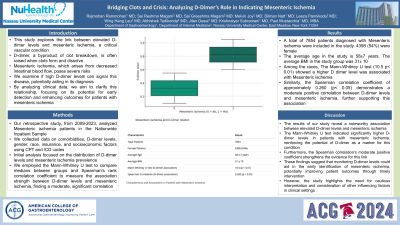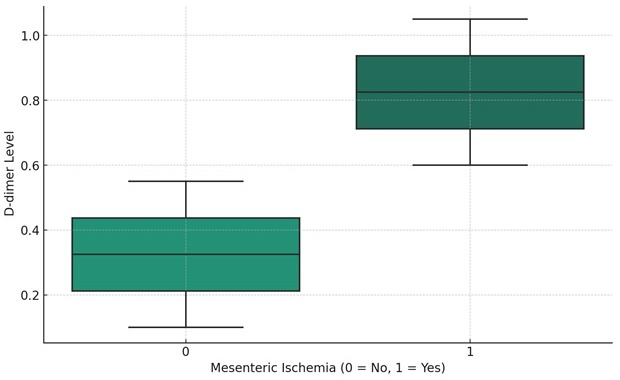Sunday Poster Session
Category: Colon
P0211 - Bridging Clots and Crisis: Analyzing D-Dimer's Role in Indicating Mesenteric Ischemia
Sunday, October 27, 2024
3:30 PM - 7:00 PM ET
Location: Exhibit Hall E

- RR
Rajmohan Rammohan, MD
Nassau University Medical Center
East Meadow, NY
Presenting Author(s)
Raj Mohan Ram Mohan, MD, Sai Reshma Magam, MD, Sai Greeshma Magam, MD, Melvin Joy, MD, Dilman Natt, MD, Leeza Pannikodu, MD, Winghang Lau, MD, Abhishek Tadikonda, MD, Jiten Desai, MD, Krishnaiyer Subramani, MD, Paul Mustacchia, MD, MBA
Nassau University Medical Center, East Meadow, NY
Introduction: This study explores the link between elevated D-dimer levels and mesenteric ischemia, a critical vascular condition. D-dimer, a byproduct of clot breakdown, is often raised when clots form and dissolve. Mesenteric ischemia, which arises from decreased intestinal blood flow, poses severe risks. We examine if high D-dimer levels can signal this disease, potentially aiding in its diagnosis. By analyzing clinical data, we aim to clarify this relationship, focusing on its potential for early detection and enhancing outcomes for patients with mesenteric ischemia
Methods: Our retrospective study, from 2009-2023, analyzed Mesenteric ischemia patients in the Nationwide Inpatient Sample. We collected data on comorbidities, D-dimer levels, gender, race, insurance, and socioeconomic factors using CPT and ICD codes. Initial analysis focused on the distribution of D-dimer levels and mesenteric ischemia prevalence. We employed the Mann-Whitney U test to compare medians between groups and Spearman's rank correlation coefficient to measure the association strength between D-dimer levels and mesenteric ischemia, finding a moderate, significant correlation.
Results: A total of 7854 patients diagnosed with Mesenteric ischemia were included in the study. 4398 (54%) were female. The average age in the study is 58±7 years. The average BMI in the study group was 31± 10. Among the races, The Mann-Whitney U test (10.5 p< 0.01) showed a higher D dimer level was associated with Mesenteric ischemia Similarly, the Spearman correlation coefficient of approximately 0.260 (p< 0.05) demonstrates a moderate positive correlation between D-dimer levels and mesenteric ischemia, further supporting this association.
Discussion: The results of our study reveal a noteworthy association between elevated D-dimer levels and mesenteric ischemia. The Mann-Whitney U test indicated significantly higher D-dimer levels in patients with mesenteric ischemia, reinforcing the potential of D-dimer as a marker for this condition. Furthermore, the Spearman correlation's moderate positive coefficient strengthens the evidence for this link. These findings suggest that monitoring D-dimer levels could aid in the early identification of mesenteric ischemia, potentially improving patient outcomes through timely intervention. However, the study highlights the need for cautious interpretation and consideration of other influencing factors in clinical settings.

Note: The table for this abstract can be viewed in the ePoster Gallery section of the ACG 2024 ePoster Site or in The American Journal of Gastroenterology's abstract supplement issue, both of which will be available starting October 27, 2024.
Disclosures:
Raj Mohan Ram Mohan, MD, Sai Reshma Magam, MD, Sai Greeshma Magam, MD, Melvin Joy, MD, Dilman Natt, MD, Leeza Pannikodu, MD, Winghang Lau, MD, Abhishek Tadikonda, MD, Jiten Desai, MD, Krishnaiyer Subramani, MD, Paul Mustacchia, MD, MBA. P0211 - Bridging Clots and Crisis: Analyzing D-Dimer's Role in Indicating Mesenteric Ischemia, ACG 2024 Annual Scientific Meeting Abstracts. Philadelphia, PA: American College of Gastroenterology.
Nassau University Medical Center, East Meadow, NY
Introduction: This study explores the link between elevated D-dimer levels and mesenteric ischemia, a critical vascular condition. D-dimer, a byproduct of clot breakdown, is often raised when clots form and dissolve. Mesenteric ischemia, which arises from decreased intestinal blood flow, poses severe risks. We examine if high D-dimer levels can signal this disease, potentially aiding in its diagnosis. By analyzing clinical data, we aim to clarify this relationship, focusing on its potential for early detection and enhancing outcomes for patients with mesenteric ischemia
Methods: Our retrospective study, from 2009-2023, analyzed Mesenteric ischemia patients in the Nationwide Inpatient Sample. We collected data on comorbidities, D-dimer levels, gender, race, insurance, and socioeconomic factors using CPT and ICD codes. Initial analysis focused on the distribution of D-dimer levels and mesenteric ischemia prevalence. We employed the Mann-Whitney U test to compare medians between groups and Spearman's rank correlation coefficient to measure the association strength between D-dimer levels and mesenteric ischemia, finding a moderate, significant correlation.
Results: A total of 7854 patients diagnosed with Mesenteric ischemia were included in the study. 4398 (54%) were female. The average age in the study is 58±7 years. The average BMI in the study group was 31± 10. Among the races, The Mann-Whitney U test (10.5 p< 0.01) showed a higher D dimer level was associated with Mesenteric ischemia Similarly, the Spearman correlation coefficient of approximately 0.260 (p< 0.05) demonstrates a moderate positive correlation between D-dimer levels and mesenteric ischemia, further supporting this association.
Discussion: The results of our study reveal a noteworthy association between elevated D-dimer levels and mesenteric ischemia. The Mann-Whitney U test indicated significantly higher D-dimer levels in patients with mesenteric ischemia, reinforcing the potential of D-dimer as a marker for this condition. Furthermore, the Spearman correlation's moderate positive coefficient strengthens the evidence for this link. These findings suggest that monitoring D-dimer levels could aid in the early identification of mesenteric ischemia, potentially improving patient outcomes through timely intervention. However, the study highlights the need for cautious interpretation and consideration of other influencing factors in clinical settings.

Figure: Mesenteric ischemia and D-Dimer relation
Note: The table for this abstract can be viewed in the ePoster Gallery section of the ACG 2024 ePoster Site or in The American Journal of Gastroenterology's abstract supplement issue, both of which will be available starting October 27, 2024.
Disclosures:
Raj Mohan Ram Mohan indicated no relevant financial relationships.
Sai Reshma Magam indicated no relevant financial relationships.
Sai Greeshma Magam indicated no relevant financial relationships.
Melvin Joy indicated no relevant financial relationships.
Dilman Natt indicated no relevant financial relationships.
Leeza Pannikodu indicated no relevant financial relationships.
Winghang Lau indicated no relevant financial relationships.
Abhishek Tadikonda indicated no relevant financial relationships.
Jiten Desai indicated no relevant financial relationships.
Krishnaiyer Subramani indicated no relevant financial relationships.
Paul Mustacchia indicated no relevant financial relationships.
Raj Mohan Ram Mohan, MD, Sai Reshma Magam, MD, Sai Greeshma Magam, MD, Melvin Joy, MD, Dilman Natt, MD, Leeza Pannikodu, MD, Winghang Lau, MD, Abhishek Tadikonda, MD, Jiten Desai, MD, Krishnaiyer Subramani, MD, Paul Mustacchia, MD, MBA. P0211 - Bridging Clots and Crisis: Analyzing D-Dimer's Role in Indicating Mesenteric Ischemia, ACG 2024 Annual Scientific Meeting Abstracts. Philadelphia, PA: American College of Gastroenterology.
